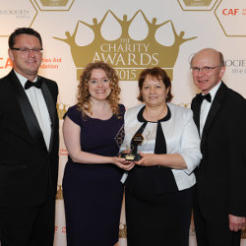Lumos Foundation had never entered an awards competition before this year. So its staff were astounded to win the overall award at the Charity Awards, says chief executive Georgette Mulheir.
Lumos is a young and growing charity, only a decade old in 2015. We are keen to raise awareness of the harm caused by the institutionalisation of children and quietly confident in our mission but, frankly, seeking awards has not been a priority. We had never entered an awards competition before this year.
Lumos runs programmes in the Czech Republic, Bulgaria, Moldova, Serbia, Ukraine, and Haiti, and we have advocacy teams in Brussels and Washington. We help governments and funding agencies in a range of ways, all dedicated to ending the institutionalisation of children.
Our Moldova team has helped the government of that very poor country to transform the lives of thousands of children with disabilities - who had been living away from families in grim ‘residential special schools’ but can now go home and attend mainstream schools for the first time. This inclusive education project continues to attract international attention.
We were alerted to Civil Society Media’s 2015 Charity Awards application process and realised it was rigorous, demanding up to 2,500 words of fully-researched copy. In Moldova, though, we felt we had a mature project which could show genuine positive results for children.
Young or old, big or small, if a charity has a project with real, demonstrable impact then there is a story worth telling. The awards application was a perfect opportunity for us to share our Moldova story.
We were incredibly busy launching Lumos in the USA when we learned we had been shortlisted in the International Aid and Development category. Despite the demands in the USA, though, I thoroughly enjoyed making a presentation to the judges in London about Moldova, a project I have been immersed in from the start.
I attended the awards night in June, with Dr Irina Malanciuc, our Moldova team director, expecting an entertaining evening and a fairly early train out of London.
That was not from any false modesty. I just looked around the 29 other finalists and thought: ‘There some wonderful charities here; important though our work is, we’ll never win ahead of the best here. So many good stories from organisations working to help people facing poverty, disease, conflict and disaster.’
Irina and I were, therefore, somewhat surprised when we won the category award. I had been told I only had eight words for a speech. Eight words! I seized the opportunity and managed to explain our complex mission in about a minute. I realised I wasn’t going to get that early train after all so we settled in to applaud the other winners.
The only way to describe our reaction when we won the overall award is to say we were gobsmacked.
I persuaded Irina, a Romanian-speaking Moldovan paediatrician, to address the audience of more than 500 people. Speaking in English, to thunderous applause, she thanked the UK for helping the most disadvantaged families and children of Moldova. I will remember that marvellous moment for many years.
JK Rowling, our founder and life president, summed up the mood within Lumos when she retweeted a picture of Irina and her colleagues, with the International Aid and Development trophy, on the steps of their office in Chisinau, with the simple phrase: “Proud beyond words!”
Irina, in turn, saw the award as a recognition of a truly joint effort. From the head office and across the organisation, Lumos has supported her team every step of the way – with, for instance, large-scale training of professionals in Moldova in the skills needed for newly created community services.
We believe we are a well-run charity. In the exacting Hallmarks of Excellence sections of the application, we had to prove it. Winning, therefore, was a tribute to the professionalism of all our staff.
What does the award mean for us in the longer term?
Lumos’ head office is in the UK but we work internationally. The award enhances our profile in the UK, where we will work with others to persuade the government to support the principle that children living outside of families, in institutions and orphanages, should not be left behind by international development policy.
More generally, we have already heard from international partners how impressed they are that we have won such a prestigious award. It is proof for those organisations, as well as politicians, supporters and donors, that our work is considered to be of the highest standard by a country they respect.
Ask me in a few years just how important that turns out to be.
Georgette Mulheir is the chief executive of Lumos









